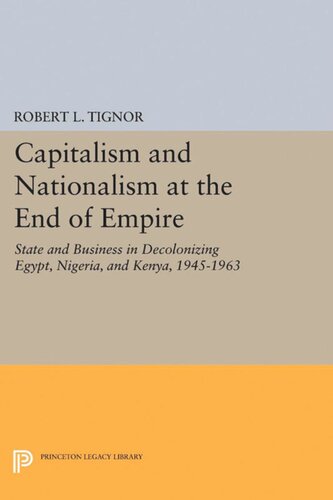

Most ebook files are in PDF format, so you can easily read them using various software such as Foxit Reader or directly on the Google Chrome browser.
Some ebook files are released by publishers in other formats such as .awz, .mobi, .epub, .fb2, etc. You may need to install specific software to read these formats on mobile/PC, such as Calibre.
Please read the tutorial at this link: https://ebookbell.com/faq
We offer FREE conversion to the popular formats you request; however, this may take some time. Therefore, right after payment, please email us, and we will try to provide the service as quickly as possible.
For some exceptional file formats or broken links (if any), please refrain from opening any disputes. Instead, email us first, and we will try to assist within a maximum of 6 hours.
EbookBell Team

4.0
16 reviewsThe two decades that followed World War II witnessed the end of the great European empires in Asia and Africa. Robert Tignor's new study of the decolonization experiences of Egypt, Nigeria, and Kenya elucidates the major factors that led to the transfer of power from British to African hands in these three territories. Employing a comparative method in order to explain the different decolonizing narratives in each territory, he argues that the different state policies toward the private business sector and foreign capital were the result of nationalist policies and attitudes and the influence of Cold War pressures on local events.
Using business records as well as official government sources, the work highlights the economic aspects of decolonization and weighs the influence of nationalist movements, changes in metropolitan attitudes toward the empire, and shifts in the international balance of power in bringing about the transfer of authority. The author concludes that the business communities did not play decisive roles, adhering instead to their time-honored role of leaving political issues to colonial officials and their nationalist critics. Tignor also finds that the nationalist movements, far from being ineffective, largely realized the primary goals of nationalist leaders that had been articulated for many decades.
Originally published in 1997.
The Princeton Legacy Library uses the latest print-on-demand technology to again make available previously out-of-print books from the distinguished backlist of Princeton University Press. These editions preserve the original texts of these important books while presenting them in durable paperback and hardcover editions. The goal of the Princeton Legacy Library is to vastly increase access to the rich scholarly heritage found in the thousands of books published by Princeton University Press since its founding in 1905.